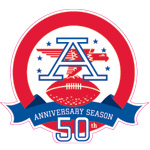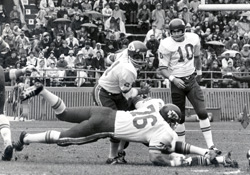If you win, they will come
 Looking back at the American Football League’s birth 50 years ago historians can point to several reasons why the league succeeded. One that is at the top of that list may be the wide-open, pass-happy offenses that many of the teams employed. These high-octane offenses drew fans to the stadiums and in front of their television sets.
Looking back at the American Football League’s birth 50 years ago historians can point to several reasons why the league succeeded. One that is at the top of that list may be the wide-open, pass-happy offenses that many of the teams employed. These high-octane offenses drew fans to the stadiums and in front of their television sets.
Another strong reason that is often overlooked is the league’s parity. The yearly promise that a team could rise to the top of the professional football world is a prospect that still captivates fans today.
 |
| The 1969 KC Chiefs won their third AFL Championship en route to victory in Super Bowl IV. |
During the 10 years the AFL existed, seven different teams won their division at least once. The only exceptions were the Denver Broncos; and the two expansion franchises that began play towards the end of the decade, the Cincinnati Bengals and Miami Dolphins.
Analyzing on-the-field success a step further, six different teams eventually hoisted the AFL Championship trophy, three of which (the Dallas Texans/Kansas City Chiefs, Houston Oilers, and Buffalo Bills) accomplished the feat multiple times. One could only imagine if interest in the league would have continued to build if one team dominated the league as the 1960s Green Bay Packers did in the National Football League.
Looking at the 10-year history of the league as a whole, five teams logged an overall winning record. Leading the way was the Dallas Texans/Kansas City Chiefs with a 92-50-5 record and a .643 winning percentage. The Los Angeles/San Diego Chargers finished a close second with the overall mark of 87-52-6 for a winning percentage of .621.
There are many reasons why the AFL captured the hearts of many pro football fans around the country. Certainly “Chief” among them was the quality of the football on the field and the prospect of each AFL team’s success.
| Division Championships | AFL Championships | Winning Record (Seasons) | |||||
| Los Angeles/San Diego Chargers | 5 | Dallas Texans/Kansas City Chiefs | 3 | Los Angeles/San Diego Chargers | 9 | ||
| Houston Oilers | 4 | Houston Oilers | 2 | Oakland Raiders | 6 | ||
| Oakland Raiders | 3 | Buffalo Bills | 2 | Dallas Texans/Kansas City Chiefs | 7 | ||
| Buffalo Bills | 3 | Oakland Raiders | 1 | Boston Patriots | 5 | ||
| Dallas Texans/Kansas City Chiefs | 2 | Los Angeles/San Diego Chargers | 1 | Houston Oilers | 4 | ||
| New York Titans/Jets | 2 | New York Titans/Jets | 1 | Buffalo Bills | 4 | ||
| Boston Patriots | 1 | Boston Patriots | 0 | New York Titans/Jets | 3 | ||
| Denver Broncos | 0 | Denver Broncos | 0 | Denver Broncos | 0 | ||
| Miami Dolphins | 0 | Miami Dolphins | 0 | Miami Dolphins | 0 | ||
| Cincinnati Bengals | 0 | Cincinnati Bengals | 0 | Cincinnati Bengals | 0 | ||
| All-Time Records of AFL Franchises | |||||||||||
| Regular Season | Post-Season | Overall | |||||||||
| Team | Win | Loss | Tie | Pct. | Win | Loss | Pct. | Win | Loss | Tie | Pct. |
| Dallas Texans/Kansas City Chiefs | 87 | 48 | 5 | .639 | 5 | 2 | .714 | 92 | 50 | 5 | .643 |
| Los Angeles/San Diego Chargers | 86 | 48 | 6 | .636 | 1 | 4 | .200 | 87 | 52 | 6 | .621 |
| Oakland Raiders | 77 | 58 | 5 | .568 | 3 | 3 | .500 | 80 | 61 | 5 | .565 |
| New York Titans/Jets | 69 | 65 | 6 | .514 | 2 | 1 | .667 | 71 | 66 | 6 | .517 |
| Houston Oilers | 70 | 66 | 4 | .514 | 2 | 3 | .400 | 72 | 69 | 4 | .510 |
| Buffalo Bills | 65 | 69 | 6 | .486 | 2 | 2 | .500 | 67 | 71 | 6 | .486 |
| Boston Patriots | 63 | 68 | 9 | .482 | 1 | 1 | .500 | 64 | 69 | 9 | .482 |
| Denver Broncos | 39 | 97 | 4 | .293 | 0 | 0 | .000 | 39 | 97 | 4 | .293 |
| Miami Dolphins | 15 | 39 | 2 | .286 | 0 | 0 | .000 | 15 | 39 | 2 | .286 |
| Cincinnati Bengals | 7 | 20 | 1 | .268 | 0 | 0 | .000 | 7 | 20 | 1 | .268 |
Road to Canton (via South Florida)
Now through Thanksgiving when the list of nominees is trimmed to 25, we’ll take a look at those players, coaches, and contributors that comprise the Class of 2010 candidates. This week our focus is on the SEVEN PLAYERS WHO ARE ELIGIBLE FOR THE FIRST TIME.
Still got it
Many current NFL players had big days in Week 3 and added to their already impressive career totals. One such player was veteran RB Fred Taylor who had his first 100-yard day of ’09.